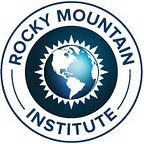Shaping the Future
Sharing analysis, innovation, and insights
For every corporation that Rocky Mountain Institute can work with to transform its energy use, there are a hundred that we can’t, even through industry-wide interventions like the Business Renewables Center. And for every national government that RMI advises on cleaning and revolutionizing its energy systems, there are a dozen that we haven’t yet collaborated with. Yet we are reaching far beyond the companies, cities, states, and nations that we work with shoulder to shoulder, by means of our research and ideas.
RMI has been a respected voice in clean energy and energy efficiency debates for 35 years. Our rigorous research and analysis, often the result of years of collaboration and convening with partners across entire industries, is something we strive to share with the world every day. With the help of partners and supporters like you, we are able to spread the vital and encouraging information about energy use that the world needs to hear before it’s too late. Here are some of the ways we’ve had an impact on the way the world thinks about energy in the past year.
Published the seminal Peak Car Ownership report,
which finds that we could see personal ownership of vehicles top out as soon as 2020 and outlines the market opportunity of electric, automated mobility services in the U.S. The report received dedicated coverage in the Washington Post, Financial Times, Fast Company, The New Yorker, Slate, Vox, and other publications.
Rebutted Energy Secretary Rick Perry’s efforts to portray coal and nuclear power plants as necessary to a reliable grid.
This so-called “baseload” power is neither necessary for reliability nor desirable in a host of other ways, as our series of blogs and op-eds has shown. We demonstrated that the increasing renewable energy supply Secretary Perry sought to portray as a threat is actually full of opportunities for a more reliable, cleaner, and more resilient grid.
Convened the first-ever eLab Summit for the electric-grid industry’s top 130 thought leaders and continued our annual eLab Accelerator workshops.
Together, we’re advancing innovation in business models, rate design, low- and moderate-income energy access, distributed grid infrastructure, and the integration of electric vehicles into the grid.
Informed the U.S. government’s more-stringent fuel-economy and emissions standards for heavy-duty trucks.
The new rules, written by regulators relying in part on our research and data, are estimated to save 1 billion metric tons of greenhouse gas emissions and $170 billion in fuel costs.
Assembled 51 of shipping’s biggest players to call on the International Maritime Organization to set ambitious emissions objectives.
We organized an appeal by the likes of Maersk and Cargill to the heads of state of all 171 member countries for the 70th meeting of the Marine Environmental Protection Committee.
Launched the Energy Web Foundation, a new nonprofit organization focused on bringing blockchain technology to the energy sector, with partner Grid Singularity.
Ten leading energy companies joined forces with RMI to launch a global blockchain initiative for energy with an initial $2.5 million of funding. Blockchains, the technology underlying cryptocurrencies like Bitcoin, have the potential to change the energy sector by reinventing the accounting system for electricity, digitizing the grid in a secure way, and helping electricity market participants better integrate and manage distributed energy resources.
Laid out best practices for utility innovation and the design, execution, and evaluation of utility pilot and demonstration projects
in collaboration with Arizona Public Service, Avista Utilities, and Con Edison. This research, disseminated in a widely read report, Pathways for Innovation, is the first of a series of projects working with cohorts of teams working on similar challenges across the electricity ecosystem.
Showed how lenders and tax equity investors can easily adapt established solar-financing models to community-scale solar,
solar plants of between 0.5 MW and 5 MW located on the distribution grid. This is helping financiers and project developers to rapidly grow this market, which could achieve more than 30 percent cost savings relative to other distributed solar installations.
Brought the concept of green revolving funds to the aviation sector.
These funds, where energy-saving projects are paid for with money saved by earlier energy-savings projects in a virtuous cycle, equips airports with practical recommendations tailored to their operations. The approach is being delivered to the Airport Cooperative Research Program of the National Academies of Sciences, Engineering, and Medicine.
Convened and supported an industry group to standardize transit data
so that every bus, train, rideshare driver, and transportation app is speaking the same language. The General Transit Feed Specification Working Group is comprised of 17 organizations and growing, including transit agencies, app providers, and data consumers.
Incorporated WattTime as a subsidiary organization.
This Silicon Valley-based nonprofit is commercializing technology that automatically detects the actual emissions impacts produced when people and companies use energy at specific locations in real time. This allows WattTime-enabled devices to change the times they draw power to maximize the use of carbon-free renewables and avoid the use of power made from burning fossil fuels — a shift that could equal taking 7 to 8 million gas-burning cars off the road.
Delivered seminal research showing the shipping industry that it is exposed to climate policy-driven risk.
Banks hold $400 billion of global shipping debt, and we laid out how inefficient shipping assets could strand millions of dollars worth of investment. The result? Funds being directed to more efficient ships by two major maritime banks, HSH Nordbank and KfW IPEX Bank, and more to follow.
Pioneered a policy framework for leading cities to achieve 80 percent carbon reductions in their buildings by 2050
by using building sales as a trigger for energy upgrades — generating tax revenue, creating jobs, and establishing a model for other states to follow.
